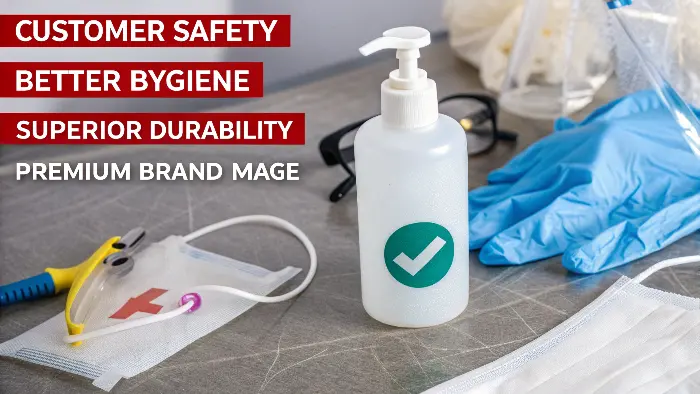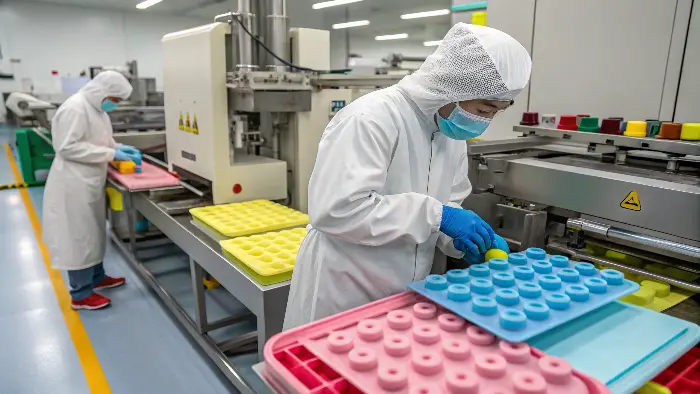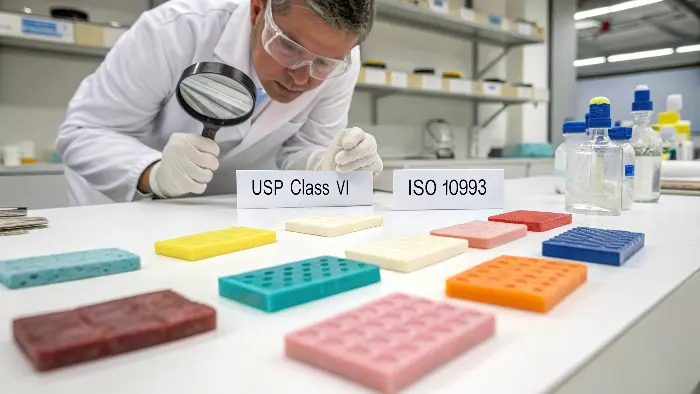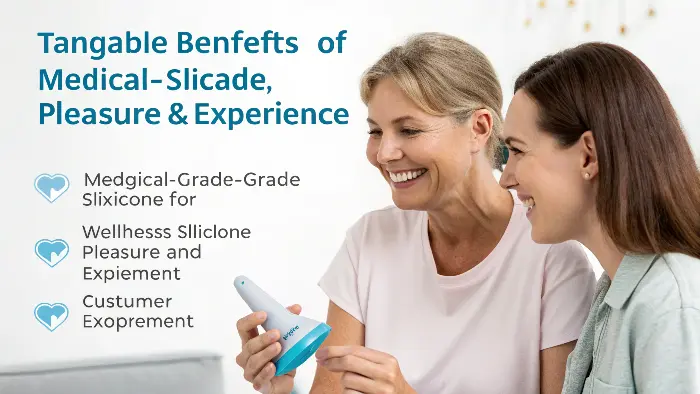Struggling to convince customers about premium pricing? Worried about material safety scares hurting your brand? Medical-grade silicone offers a clear path to trust and quality.
Medical-grade silicone in adult toys is worth the "fuss" because it signifies superior body-safety, durability, and a non-porous nature that prevents bacterial growth. It meets stringent biocompatibility standards, offering peace of mind and a premium experience, which is absolutely vital for intimate products.
Alright, let’s get real. "Medical-grade silicone" – it sounds impressive, doesn’t it? Like something straight out of a high-tech lab. And in many ways, it is! As the founder of PrivyPlay, where "Elevating Pleasure, Empowering Confidence" is our mantra, the materials we use are not just a footnote; they’re a headline. I’ve seen this industry evolve, and I can tell you, the conversation around materials, especially silicone, has become front and center for savvy brand owners like you. So, let’s break down what this stuff actually is and why it matters so much – not just for your customers, but for your business’s reputation and bottom line. It’s more than just a buzzword; it’s a benchmark.
What Exactly Qualifies Silicone as "Medical-Grade" for Our Adult Toys?
Ever feel like "medical-grade" is just marketing fluff? Wondering what actually separates it from, say, your kitchen spatula silicone? It’s confusing, I get it, and clarity is key when you’re sourcing.
Silicone qualifies as "medical-grade" when it passes specific biocompatibility tests (like USP Class VI or ISO 10993) ensuring it’s non-toxic, non-irritating, and safe for prolonged skin or internal contact. This means it won’t leach harmful chemicals or cause adverse reactions.
So, what’s the secret sauce for "medical-grade"? It’s not just any old silicone. The big deal is biocompatibility. This is a fancy word that basically means the material plays nice with living tissue. Think about it – these products are used in very intimate ways! You definitely don’t want materials causing irritation, allergic reactions, or worse. Manufacturers like us at PrivyPlay, when we say medical-grade, we’re talking about silicone that has undergone rigorous testing. The most common standards you’ll hear about are USP Class VI (United States Pharmacopeia) or ISO 10993. These aren’t just casual check-boxes; they involve tests for things like cytotoxicity (does it kill cells?), sensitization (does it cause allergic reactions?), and irritation. It’s serious stuff.
Here’s a quick rundown:
- Purity: Medical-grade silicone is typically platinum-cured. This process results in a purer, cleaner silicone with fewer byproducts compared to cheaper, peroxide-cured silicones. Fewer byproducts mean less chance of anything nasty leaching out.
- Testing Standards:
- USP Class VI: A common standard for plastics used in medical devices.
- ISO 10993: A series of standards for evaluating the biocompatibility of medical devices.
- Non-Porous Nature: Critically, it’s non-porous. This means no tiny holes for bacteria or fungi to hide and breed in. This is HUGE for hygiene.
I remember once, early in my career as a sourcing manager for a wellness brand, a potential supplier tried to pass off a lower-grade silicone as "good enough." The samples looked fine on the surface, but when we dug into the material specs and pushed for certifications, the story changed. That’s why, as a brand owner, you gotta ask the tough questions. It’s your reputation on the line. And believe me, your customers are getting savvier about this stuff too!Why Should My Brand Insist on Medical-Grade Silicone Over Cheaper Alternatives?
Tempted by lower material costs to boost margins? Worried that "good enough" might actually harm your customers and your brand’s reputation in the long run? It’s a balancing act, but some corners just shouldn’t be cut – especially these ones.
Your brand should insist on medical-grade silicone primarily for customer safety and trust. It significantly reduces risks of adverse reactions, ensures better hygiene due to its non-porous nature, offers superior durability, and builds a premium brand image, justifying higher price points.
 Look, I get it. As an e-commerce entrepreneur or purchasing manager, you’re always looking at the bottom line. Cheaper materials can seem tempting. But let me tell you from my years in this business, especially in the adult products sector, skimping on material quality for something as intimate as a sex toy is a fast track to trouble. Why insist on medical-grade silicone? It’s about building a brand that lasts, one that "Empowers Confidence." Here’s the breakdown from a business perspective: |
Benefit of Medical-Grade Silicone | Impact on Your Brand |
|---|---|---|
| Enhanced Customer Safety | Reduces product liability, minimizes customer complaints related to irritation/allergies. Builds trust. | |
| Superior Hygiene | Easier to clean thoroughly, less risk of bacterial contamination. A major selling point for health-conscious consumers. | |
| Increased Durability | Resists degradation, tearing, and breakdown from lubes or cleaning agents better than cheap alternatives. Means longer product life, better value. | |
| Premium Brand Perception | Signals quality and care, justifying higher retail prices. Attracts discerning customers. | |
| Reduced Returns/Complaints | Higher quality materials often mean fewer defects and issues, saving you hassle and money in the long run. |
I’ve seen brands try to cut corners with materials like jelly rubber or low-grade TPE to save a buck. And yeah, maybe they sell a few cheap units. But then the negative reviews roll in: "it smells weird," "it gave me a rash," "it fell apart." That kind of damage is hard to undo. At PrivyPlay, we made a conscious decision to focus on quality, and medical-grade silicone is a cornerstone of that. It’s an investment in your customer’s well-being and your brand’s future. Trust me, it pays off. 🔥 Plus, nobody wants their brand associated with that kind of feedback, right?
How Does the Manufacturing Process for Medical-Grade Silicone Toys Actually Guarantee Safety and Quality?
Ever wonder what goes on behind the factory doors to make those silky-smooth silicone toys? Concerned that even with good material, the manufacturing process itself might introduce issues? It’s a valid point, and something I obsess over!
The manufacturing process for medical-grade silicone toys guarantees safety and quality through strict protocols: using certified raw materials, controlled cleanroom environments (ideally), precise molding techniques, platinum-curing processes for purity, and rigorous post-production quality control checks, including dimensional and functional testing.

Okay, so you’ve sourced top-notch medical-grade silicone. Awesome! But the story doesn’t end there. How that beautiful material is handled and processed is just as crucial. It’s like having the best ingredients for a cake – if the baker messes up, you still get a bad cake, right? At PrivyPlay, we’re obsessed with our manufacturing processes because we know this. It’s not just about the raw stuff; it’s the craftsmanship.
Here’s what a quality-focused manufacturing process for medical-grade silicone toys involves:
- Raw Material Verification: It starts with confirming the silicone received is indeed the certified medical-grade stuff you ordered. No funny business. We check batch numbers, supplier certs, everything.
- Cleanliness is Key: Ideally, production, especially molding and initial handling, happens in a controlled environment. Dust, contaminants – these are the enemies! Some high-end facilities even use cleanroom conditions for certain stages. This isn’t always feasible for all price points, but minimizing contamination is crucial.
- Precise Molding: The molds themselves must be high quality and meticulously maintained. This ensures the final product has a smooth, flawless surface with no imperfections where bacteria could hide. Think of it like a perfectly polished sculpture.
- Curing Process: As I mentioned, platinum-curing is preferred. This process needs to be carefully controlled – temperature, time – to ensure the silicone cures properly and fully, without any uncured material or unwanted byproducts. Peroxide-cured silicones, while cheaper, can sometimes leave residues if not handled perfectly.
- Post-Cure Treatment: Often, there’s a post-curing bake to remove any residual volatile organic compounds (VOCs), making the product even cleaner and ensuring no weird smells.
- Quality Control (QC): This is non-negotiable. Each piece (or a statistically significant sample from each batch) should be inspected for visual defects (bubbles, tears, blemishes), dimensional accuracy, and, for vibrators, functional integrity. Does it turn on? Do all the modes work? Basic stuff, but essential.
I’ve walked through countless factories in my career. You can tell a lot about a manufacturer by how clean their silicone molding area is and how seriously they take their QC. It’s these details that "Elevate Pleasure" from just okay to truly exceptional and safe. It’s not just about output; it’s about pride in the product.Are There Different "Grades" Within Medical-Grade Silicone, and What Should I Look For?
You hear "medical-grade," but is it all the same? Worried there might be "medical-grade-lite" versus the real premium deal, and how do you even tell the difference when sourcing? It’s a bit nuanced, I’ll admit – like coffee beans, not all "arabica" is equal!
Yes, there are nuances. Look for platinum-cured silicone that meets USP Class VI or ISO 10993. Some silicones are also rated for implantable use (even higher grade, often overkill for toys) versus skin contact. For toys, Class VI is generally the gold standard for body-safety.

So, "medical-grade" is a good starting point, but savvy brand owners should dig a little deeper. It’s not quite a one-size-fits-all label. Think of it like organic food – there are different certification levels and specific standards. You want the good stuff, not just the label.
Here’s what I tell my clients to look out for:
- Curing Method is King:
- Platinum-cured silicone: This is what you want. It’s cleaner, purer, and doesn’t produce funky byproducts like peroxide-cured silicone can. It results in a more durable and truly inert material. It’s more expensive, yes, but for intimate products, it’s the way to go. It gives that beautiful, non-tacky finish.
- Peroxide-cured silicone: Cheaper, and can sometimes have a slight odor or feel slightly tackier if not processed perfectly. While some peroxide-cured silicones can meet certain biocompatibility tests, platinum is generally superior for adult toys in terms of feel and purity.
- Specific Certifications:
- USP Class VI: This is a very common and respected standard for medical device materials. It involves a series of biological reactivity tests in vivo (in living organisms). If a supplier says "medical-grade," ask if it’s Class VI compliant and if they can show test reports.
- ISO 10993: This is another set of international standards for biocompatibility. It’s comprehensive and well-regarded globally.
- "Implantable" vs. "Skin Contact": Some medical-grade silicones are certified for long-term implantation in the human body (like in pacemakers or joint replacements). This is often an even higher grade (and price!) than what’s strictly necessary for adult toys, which are typically for external or short-term internal use. For toys, a high-quality, platinum-cured silicone meeting USP Class VI for skin/mucosal contact is usually excellent and the right balance of safety and cost.
When I’m sourcing for PrivyPlay, or advising other brands, I specifically push for platinum-cured, USP Class VI (or equivalent ISO 10993) compliant silicone. It’s not just about ticking a box; it’s about understanding what those certifications mean for the end-user’s safety and overall premium experience. Don’t be shy to ask your manufacturer for the technical data sheets (TDS) for the specific silicone grade they plan to use. That sheet will tell you a lot! This level of detail – it’s what separates the pros.Beyond Safety, What Are the Tangible Benefits of Medical-Grade Silicone for the User’s Actual Pleasure and Experience?
Safety is paramount, sure. We’ve established that. But do customers feel a difference with medical-grade silicone? Does it actually make the toy better in terms of pleasure, or is it just a behind-the-scenes safety feature? Oh, it makes a HUGE difference!
Medical-grade silicone enhances user pleasure through its silky, skin-like feel, optimal firmness/softness customization, non-porous surface for smooth gliding (especially with lube), body-heat retention for comfort, and odorlessness, all contributing to a more luxurious and focused intimate experience.

This is where "Elevating Pleasure" really comes into play! Safety is the foundation, the non-negotiable. But medical-grade silicone also brings a whole host of benefits that directly impact how a toy feels and performs. It’s not just an invisible shield; it’s an active participant in the experience. It’s like comparing a scratchy wool sweater to a cashmere one – both keep you warm, but one feels a whole lot better!
Think about these tactile and sensory advantages:
- Silky, Skin-Like Texture: High-quality, platinum-cured silicone has this incredibly smooth, almost velvety feel that’s very different from cheaper plastics or rubbers like TPR (thermoplastic rubber), which can feel tacky or rubbery. It just feels more luxurious and comfortable against the skin.
- Tunable Durometer (Hardness/Softness): Silicone can be manufactured in a wide range of firmness levels (measured in "Shore A" durometer). This allows designers like us at PrivyPlay to fine-tune the product for its intended use – a soft, yielding texture for some sensations, a firmer feel for others, or even dual-density for realism.
- Non-Porous = Smooth Glide: Because it has no pores, the surface is incredibly smooth. This means less friction and a better experience with lubricants. Lubes glide over it beautifully, enhancing sensation rather than getting absorbed or feeling sticky.
- Body Heat Retention: Silicone tends to warm up to body temperature relatively quickly and retain that heat, which can make the toy feel more natural and integrated with the body during use. Cold toys? Not so fun, especially for internal use. Brrr.
- Odorless & Tasteless: Unlike some cheaper materials (I’m looking at you, jelly and some TPRs!), good silicone is odorless and tasteless. This is a huge plus for many users, as chemical smells can be a major turn-off and interfere with intimacy.
- Hypoallergenic: While no material is 100% allergen-proof for 100% of people, medical-grade silicone is about as close as you can get. This "Empowers Confidence" for users with sensitive skin or allergies to latex or other materials.
I’ve had so many customers tell me they switched to silicone toys and would never go back precisely because of these experiential benefits. It’s that combination of safety and sensory delight that makes it a winner. It just feels premium.As a Brand Owner, How Can I Actually Verify a Manufacturer’s "Medical-Grade Silicone" Claims?
So a supplier says they use medical-grade silicone. Great! But… how do you really know? Worried about being misled by fancy words without the proof to back it up? You absolutely need to verify this stuff – your brand depends on it!
Verify claims by requesting material safety data sheets (MSDS/SDS), specific biocompatibility test reports (USP Class VI, ISO 10993) for the exact silicone grade used, and certifications from reputable third-party labs. Don’t just take their word for it; ask for the paperwork!

This is where your due diligence as a brand owner or sourcing manager is absolutely critical. Trust, but verify – especially in this industry. Anyone can say they use medical-grade silicone. Proving it is another matter. At PrivyPlay, we believe in transparency because we stand by our materials and processes. We want you to ask these questions.
Here’s your checklist for verification:
- Ask for the Technical Data Sheet (TDS): Every legitimate silicone grade will have a TDS from its manufacturer (e.g., Dow, Wacker, Shin-Etsu, or other reputable raw material suppliers). This sheet details its properties, curing type (platinum vs. peroxide), and often its compliance with standards.
- Request Biocompatibility Test Reports: This is key. Ask for copies of USP Class VI or ISO 10993 test reports. Critically, these reports should be for the specific silicone grade being used in your products, not just a generic report for a medical-grade silicone the factory once used for something else. And check the dates – are they recent?
- Check the Source of the Test Reports: Are they from a reputable, accredited third-party testing laboratory (like SGS, Intertek, TUV)? A manufacturer’s internal report is less convincing than one from an independent lab.
- Ask About the Curing Process: Confirm they are using platinum-cured silicone if that’s what you’re specifying. This should be on the TDS too.
- Material Traceability (If Possible): For larger orders or ongoing relationships, inquire about their material batch tracking. Can they trace the silicone in your products back to a specific batch from their supplier? This is advanced stuff, but shows serious commitment to quality control.
- Sample Testing (Optional but Recommended for Large Commitments): If you’re placing a very large order or building a flagship product line, you might even consider having a sample of the finished product (or raw material from their stock) independently tested by a lab of your choice. This costs money, sure, but for ultimate peace of mind and brand protection, it can be worth it. I did this when I was starting out with a major new line for a previous brand – talk about sleeping better at night!
I’ve had potential clients come to me after being burned by other suppliers who made claims they couldn’t back up. It’s a tough lesson to learn, and an expensive one. Doing this homework upfront protects your brand, your customers, and ultimately, your business. It’s about "Empowering Confidence" in your supply chain, not just in the bedroom.Conclusion
Medical-grade silicone isn’t just a feature; it’s a commitment to safety, quality, and a superior user experience. For adult toy brands, choosing it means building trust and elevating pleasure – core to any successful intimate wellness business. Choose wisely!
